Private label goods are products produced by a manufacturer but sold under a retailer’s brand. The private label process isn’t that different from buying products for resale. You still have to supply products and providers, build a collection, and market them. Nonetheless, these products take your manufacturer, not the producer.
Whether you are a veteran vendor or only getting started on Amazon, then you’ll need a competitive edge. Download Smart Inventory Management for Increased Profitability from Payability and you’ll get tips on inventory management, legal tools, money flow, and more!
Download eBook
Now let’s see how to begin building your brand using private label products.
Step 1: Research Products to Boost

Pictures from leftThe Pure Source, Tailor Made, Kamuk
All sorts products are available from private label providers: kitchen products, electronics, specialty foods, cosmetics and skincare, tools, clothing, and fashion accessories, to name only a few. The actual challenge is not finding a product which you can private label, it’s finding one which can make you money. Consumer demand, competition, and cost play a role in a profitable private label program. So careful study is your first step, and here’s how to begin.
Research Popular Products on Amazon
Even if you don’t plan to sell on Amazon, it’s a wonderful place to study hot-selling products and get ideas for things to market under your personal label. Since the world’s largest retailer, Amazon covers every product category possible. Better yet, they provide loads of trending revenue data which you can use to research top sellers in any niche you want to pursue.
What you’ll use for this are Amazon’s Best Sellers webpages, where you can drill down and locate top vendors in any kind or sub-category. Best Sellers pages also offer you great insight into customer demand for all sorts of products, and a good image of this competition. You can learn about using Amazon to study potential products in our article about what to sell on Amazon.
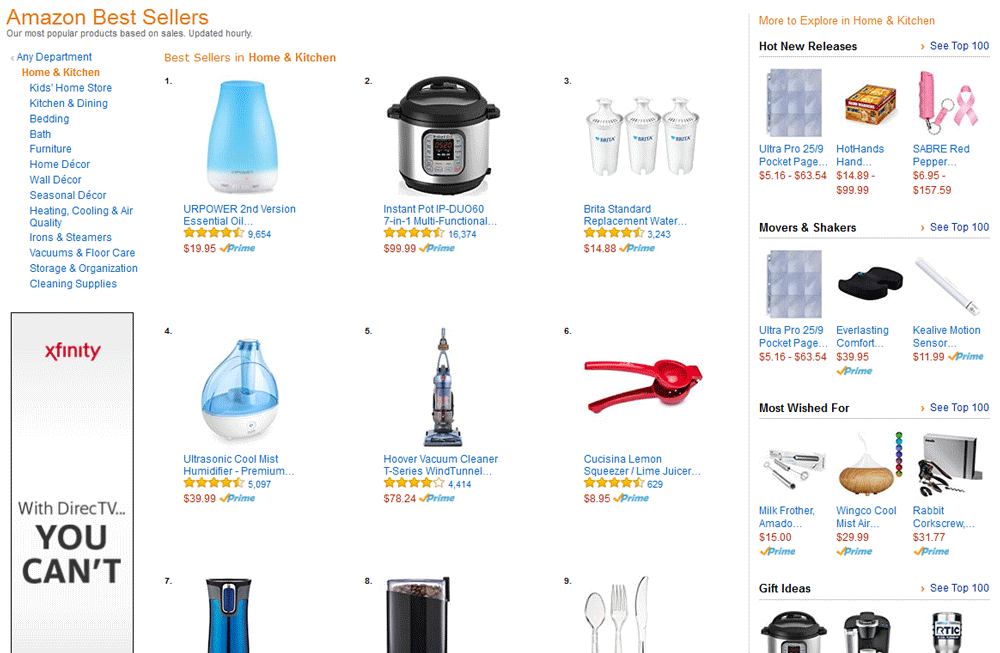
Source: Amazon
Research Popular Products With Google AdWords
Google has a secret weapon that lets you see how many people are looking for a specific term online. It is the Keyword Finder Tool in Google AdWords. This is a great way to gauge buyer requirement for goods, even if you don’t plan to advertise on Google. Using search terms, you are able to see just how many people search for a certain type of product every month. If nobody is looking for it, then you will likely have difficulty selling it. However, if people are searching for it, it might be worth pursuing.
By Way of Example, the Keyword Finder shows us that about 9,900 folks hunt for plastic wine glasses Every Month in the US:
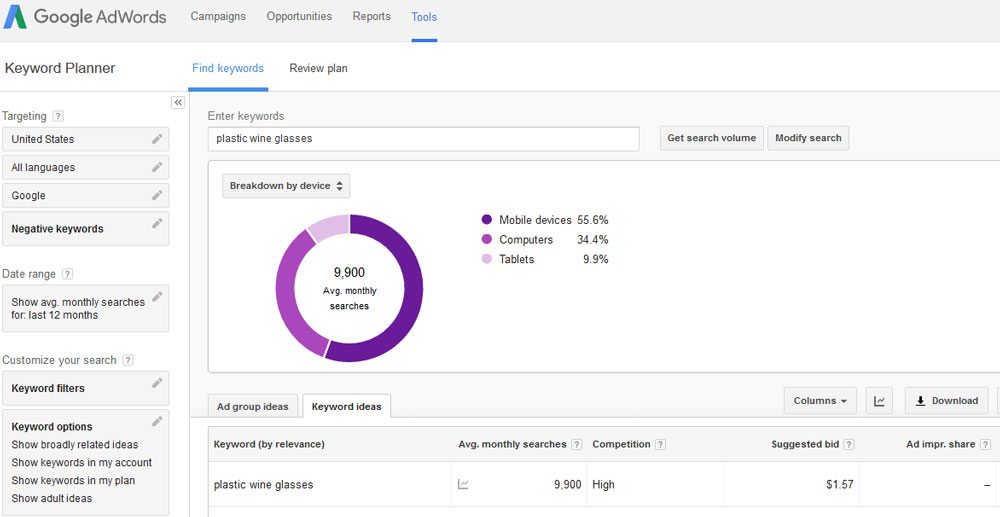
Source: Google AdWords
This search data shows remarkable demand, but let us find out what else AdWords can tell us in our search to see whether plastic wine glasses are really worth buying onto a personal label.
Under the Competition column over, AdWords provides an idea of this competition you’ll face if you choose to sell this merchandise. They speed search terms as High, Medium or Low competition based on how many AdWords advertisers pay to run ads for that particular term. In cases like this, quite lots of them aim plastic wine glasses as it lists High contest.
When starting out in private label sales, products with great search traffic, obviously 2000+ searches per month, and Medium or Low rivalry are a much better bet. They’ll also be more economical to advertise on AdWords if that is a part of your marketing program.
Before we move on, the AdWords Keyword Tool offers you more than just search amounts. As an example, the graph above shows which devices people use when hunting (cellular, desktop, etc.). This data is useful when planning your website after in Step 7. You may even filter for geographical search data, daily tendencies, plus even more. Learn how to use these features here.
Even in the event that you don’t plan to advertise on Google AdWords, this keyword research along with product study on Amazon will be able to help you pinpoint in-demand merchandise to market under your personal label. Now let’s see how to seek out private label suppliers for these products.
Step 2: Locate Personal Label Suppliers
There are several ways to locate manufacturers that appeal to private label resellers. Where you begin your search is dependent largely on which type of products that you need to market under your private label. Following is a peek at some high places to begin your search and we’ll explore each in more detail below.
| Source | Finest For | Why this Works |
|---|---|---|
| Alibaba, IndiaMart, Global Sources | All types of household, apparel, sport, instrument, accessory products and much more | The Top import marketplaces lists millions of products that you can import for significantly less than most US-made products |
| General search and locating US manufacturers specifically | You can locate US manufacturers for food, cosmetics, vitamins, and other items that must meet health or safety guidelines | |
| Indoor Buyers Trade | Meeting manufacturers and vendors in person | Buyer’s markets exist for every conceivable product category and are a Terrific place to find possible private label products |
| Malls & Stores | Getting ideas, seeing products in person & locating manufacturer titles | Product labels are a goldmine of manufacturing information, plus you can assess the quality of items |
Alibaba, IndiaMart, Global Resources & Other Import Marketplaces
All these are among the very best names in global product sourcing. Of the three, Alibaba is the only newest sellers turn to. Alibaba lists millions of products from producers worldwide, the majority being in China. The site makes it effortless to look for almost any product imaginable. Plus you can sort the results many ways such as price, material, minimum order, and even the ranking of the provider:
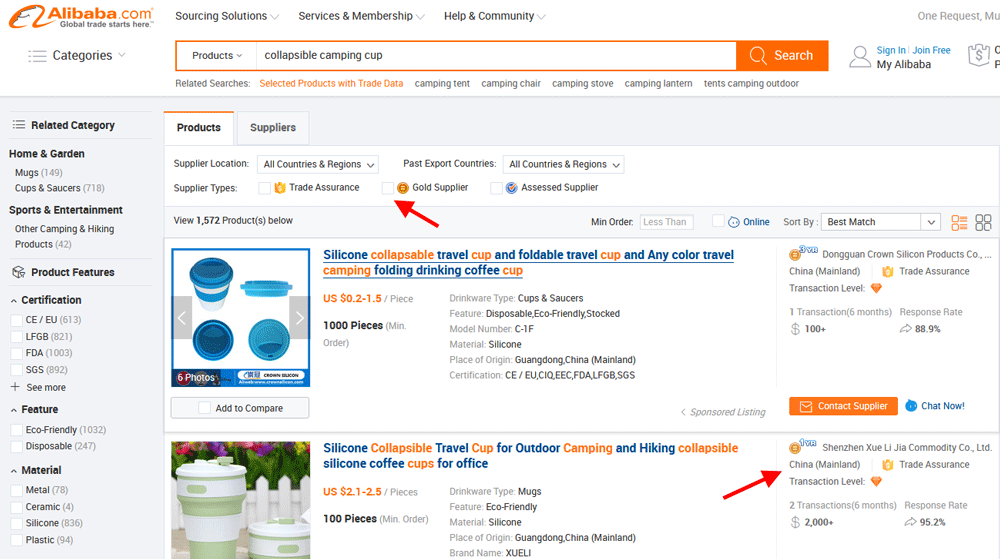
Source: Alibaba
Since you need to pay for goods upfront, usually via wire transfer, it may be nerve-wracking to think about ordering through Alibaba and similar sites. But there are safeguards in place, including Alibaba’s Gold Supplier vendor rating. Should you stick with reputable marketplaces and use their high-ranked vendors, you need to be safe from scammers.
If you decide to go this route to source private label products, first look for products you wish to market. You can incorporate the expression private label in your hunt, but do not limit yourself on those websites. As soon as you have a few candidates, get in touch with every supplier to see whether they offer private label packaging. Many do even if they don’t cite it in their list. In addition, don’t be reluctant to negotiate a lesser purchase minimal or cost, many expect this and are ready to negotiate.
Google & Other Search Engines
Google search is helpful for finding manufacturers worldwide or specifically in the united states. This is a good way to locate US-based private label suppliers for products that have to meet health or safety requirements like specialty foods, seasoningssupplements, vitamins and so forth. Simply search for whatever you’d like to sell with this detailed search format:
- Product title private label provider
By way of instance, let us say we want to sell gourmet baking mixes and prefer to locate a US provider. We’ll use Google to search for:
- Baking mixtures private label supplier us
This gives us a full list of US-based private label providers to review and contact:
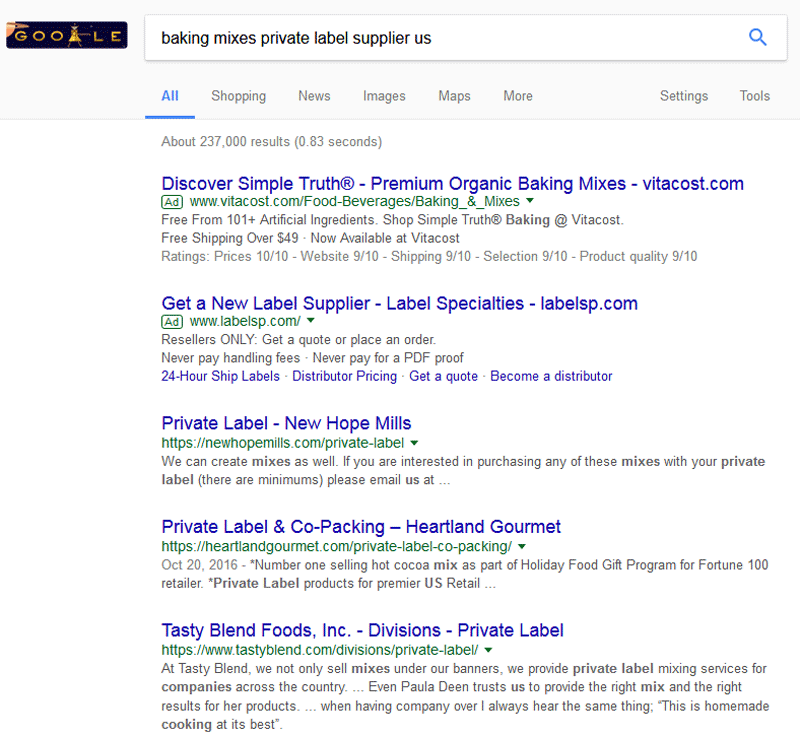
Source: Google
Indoor Buyers Markets
Wholesale buyers markets are one-stop shops for access to manufacturers in every industry, from home decor, to fashion accessories, to specialty meals. These markets hold private label opportunities since all sorts of producers attend and many accommodate private label needs.
Here again, Google will help you find buyers markets for products by searching:
- Your product or class wholesale buyers markets
Many popular buyers markets unite home fashions and accessories, kitchenwares, gift, specialty apparel baby, and fashion accessories categories, like the wholesale markets in the Dallas Market Center:
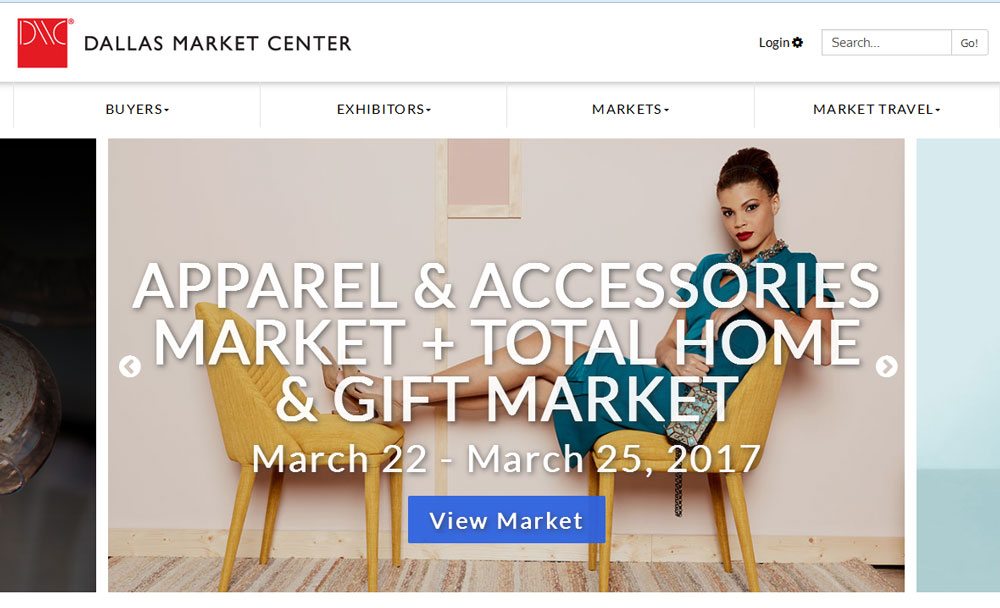
Source: Dallas Market Center
Here are other major buyers markets across the country:
- Americas Mart — Atlanta
- NY NOW Wholesaler Gift & Home
- Windy City Present & Home — Chicago
- Los Angeles Gift & Home
- LasVegas Market
Malls & Stores
Your favourite shops may be a goldmine of manufacturer names for goods that you want to sell under your personal label. Most product labels feature manufacturer names and place, some even include manufacturer websites. Even those sold under the store’s own label occasionally carry the manufacturing city and state. You can use this information in a Google search for this:
- Product name private label town nation
Armed with a mobile phone camera, you can gather loads of producer contact info during visits to the mall, specialty stores, and big box stores.
Step 3: Request Quotes & Sample Products
After picking the products that you need to market and confirming the suppliers will private label for you personally, it’s time to request samples and quotes. Estimates must include these 4 things:
- Merchandise prices for the amount ordered
- Any private labeling or packaging fees
- Shipping fees to your satisfaction location
- Any import requirements and duties that you will need to meet or cover
Some suppliers send free samples if you are an established firm with a site to reveal them. However others charge for samples requests from buyers that are new. If this is so, it’s usually money well-spent.
Product samples give you a chance to completely review your merchandise to be certain it’s what you wish to represent your brandnew. Remember it is your brand, not the manufacturer’s name, that your customer sees. It must be worthy of your title because you’re the person who needs to stand behind it. Physical samples also are useful when designing your product packaging.
Step 4: Design Your Brand, Logo & Gamble
This step is important to the achievement of your private label brand. From the appearance of your logo to package styling, this is where your imagination will help deliver an image to buyers and push earnings.
Need a little inspiration? Look no further than Pinterest to get a treasure trove of personal label packaging ideas:
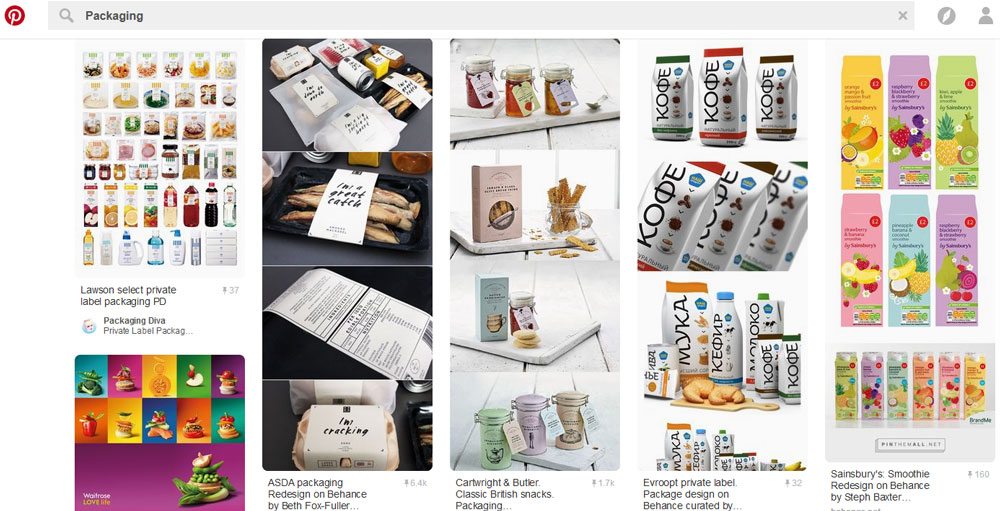
Source: Pinterest
If you do not have the design skills to craft a logo, labels, or packaging, then do not worry. There are plenty of budget-friendly freelance artists ready to help on Fiverr. Share your brand ideas or samples of a new look-and-feel that you hope to emulate, and they’ll craft whatever you need.
Specifically, your personal label manufacturer will need art for:
1. Your Brand Logo
Including emblem artwork files for various printing needs and also for website use.
2. Your Branded Product Packaging
Private label packaging can vary from simple labels to paper sleeves, hang cards, or boxes; anything applies to your product. How it’s handled depends on your provider’s abilities and what you need to your brand. Since this is an integral component in the private label procedure, it needs to be part of your initial conversation with potential suppliers.
Most frequently, your supplier provides artwork specifications for your custom packaging. Give these specs into your own designer and they’ll create the necessary documents to send to a supplier. Using these, the provider prints packaging and assembles the final products for you.
Sometimes, private label suppliers take good care of designing your labels or alternative packing for you. You just have to forward them your emblem. There might even be a reason to publish your specialty packing and assemble products yourself once they arrive. It really depends on your operation and branding goals.
So you’re almost ready to place your private label order. But before you jump in, let us look at how you can conduct your own operation.
Step 5: Decide How to Fulfill Orders
Before placing your product purchase, you want to decide how you are going to store products and put them in to your customer’s hands. You want to know this upfront so that you can present your provider the correct shipping address when you place your order.
If you intend to sell your private label products in your retail store, this is an easy step. But if you intend to sell on the internet and ship products to buyers, then you want to decide how you’ll meet orders, meaning you’ll save products and pack and ship orders.
You’ve got three main choices for order fulfillment, for example:
- In-house fulfillment using your warehouse, house, or office
- Outsourced fulfillment using a fulfillment center
- Drop-ship satisfaction if your personal label supplier offers that support (some do)
To learn more about each option, check out our entire manual to in-house vs. outsourced order fulfillment. And in the Event That You already plan to outsource satisfaction to your private label products, start your search for the perfect fulfillment partner with this free support:
See Fulfillment Companies
After this measure is decided, it is time to purchase your private label products.
Step 6: Order Your Favorite Products
You’re ready to place your Purchase once you complete these four steps:
- Selected your merchandise and provider
- Tested products to ensure they meet your criteria
- Engineered your emblem or packaging art
- Determined by the location where you will sell or ship products
As a new buyer, you likely will have to prepay your order, including shipping. Now, be sure to fully review your quotation or purchase agreement, and double check the following for accuracy:
- Product pricing and shipping charges match your quotation
- Delivery date, or date range when importing, is clearly said
- Import demands or responsibilities are included, if applicable
- No surprise add-on fees appear that weren’t on your original quotation
As soon as you’re happy with the purchase arrangement, you can place your order and cover. Wire transfer, credit card, and even PayPal are common obligations that suppliers accept.
While you wait for your order to arrive, another step is getting your site and other selling platforms like Amazon up and operating. Let us explore your options.
Step 7: Construct a Website & Sell Your Products
There are numerous methods in which you can advertise your brand and sell private label solutions. Some sellers stick to their platform and societal channels for all of their sales. Other people focus solely on Amazon or market through their own site and Amazon.
To build a new you really should have your own website, even in the event that you plan to sell on Amazon. These huge marketplaces bring from the revenue, but it’s hard to create a unique identity if that is your only platform. Plus, if you sell only on Amazon or eBay, you’re at the mercy of their whims. Any day can bring a switch to vendor fees, requirements that you need to meet, etc.
So here is a look at several approaches in which you can set up a website and/or sell on the internet through marketplaces. There’s much too much information to cover in detail , but we have plenty of articles that will assist you prepare the site or selling platform that’s right for you.
Here’s a look at the different Kinds of ecommerce platforms you can use to market online, and links to guides which can get you started:
| Platform: | Best For: | Get Started Here: |
|---|---|---|
| Square Free Online Store | Online sellers and retail shops needing a fast, free all-in-one website that includes payment processing along with in-store point-of-sale features | Watch how to launch your Square online Shop. |
| WordPress Online Store | Sellers who wish to sell private label products on line and build a modern blog-style site to advertise their new and engage their neighborhood | See the way to market merchandise utilizing WordPress See how to launch a Ecwid Store on WordPress |
| Ecommerce Platforms like Shopify & BigCommerce | Sellers who are primarily centered on product sales and who wish to build a quantity online selling business with top order and inventory management tools | View our comparisons of dedicated ecommerce platforms. |
| Spreesy Social Media Selling | Sellers who Wish to focus their sales and marketing campaigns on social media sites like Facebook, Pinterest, and Instagram all from one central platform | Learn more about Spreesy’s social networking selling platform |
| Amazon | Sellers who Wish to sell private label products on Amazon | Learn more about advertising on Amazon, and find out about Fulfillment from Amazon (FBA) |
The Most Important Thing
Private label products let you build a brand around an assortment of goods that you don’t have to produce yourself. Many stores and online vendors, big and small, do this with great success, but it takes work to find the right products and manage one or more suppliers. Some sellers find an in-demand item on Amazon and start their very own private label version to sell just on Amazon. Others build a new around an whole collection of private label products and market them on engaging branded websites.
However you intend to sell private label products, the process is exactly the same. From creating a brand notion, to finding the ideal products, to crafting a new that is your own, it takes time and careful preparation. But it can pay off big if you’re willing to spend the job. Bear in mind that BigCommerce has everything you want to start and manage an internet shop, plus it may integrate with a few of the most significant eCommerce partners within the business.
Visit BigCommerce
Can you sell private label products under your brand? We would love to hear your experiences and ideas in the comments below.

